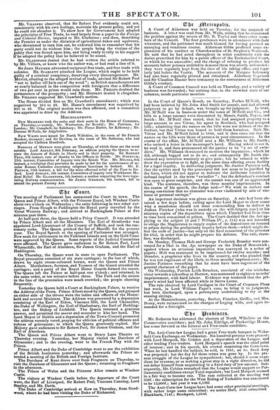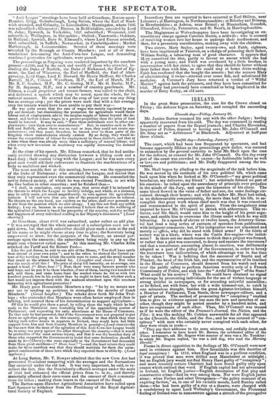Zbe 413robinres.
Mr. Sotheron has addressed the electors of North Wiltshire as the Conservative candidate ; and Mr. John Edridge, of Puckeridge House, has come forward as the Liberal and Free-trade candidate.
The Anti-Corn-law League had. a great Free-trade banquet in Wake- field Corn Exchange, on Wedoiesday. Six hundred persons were present ; with Lord Morpetit, Mr. Cobden and a deputation of the League, and other leading Free-traders. Lord Morpeth's speech was the chief point of interest ; and in his speech, his avowal respecting the Coro-laws. When he last handled the'Subject, he said, in 1841, an 8s. fixed duty was proposed ; but the day for those terms was gone by. In the pre • sent struggle of the League he sympathized ; but, should it seem expe- dient for revenue, or as making a great step in a right direction, he did not debar himself from acquiescing in a fixed duty of low amount. Sub- sequently, Mr. Cobden remarked that the League would support no Par- liamentary candidates except Total-repealers ; but Lord Morpeth seemed in a fair way to become one. The sum collected at the meeting was 3581.: the subscription for the West Riding of Yorkshire was announced to be 13,0001.; last year it was 6,139/. The Anti-Corn-law League have had some other provincial meetings, with rather large sums subscribed : we notice Hull, 354/. subscribed Blackburn, 7141.; Stockport, 1,014/.
"Anti-League" meetings have been held at Grantham, Barton-upon- Humber, Brigg, Gainsborough, Long Sutton, where the Earl of Sand- wich attended, and Grimsby, in Lincolnshire; Huntingdon, where 7201. was subscribed ; Gloucester ; Bletsoe, in Bedfordshire, attended by Lord St. John ; Epwortb, in Yorkshire, 122/. subscribed ; Worcester, 550/. subscribed; Wellington, in Shropshire ; Oxford ; Tamworth ; Oakham, in Rutland ; Ipswich, Bury St. Edmund's, where Lord Euston attended, 5001. subscribed, in Suffolk ; Newmarket, in Cambridgeshire ; Market Harborough, in Leicestershire. Several of these meetings were attended by the Borough or County Members ; and at all of them, resolutions denouncing the Anti-Corn-law League, and demanding continued protection for agriculture, were passed.
The proceedings at Steyning were rendered important by the numbers present-2,000, and by the rank and wealth of those who attended, in- cluding the Duke of Norfolk, the Duke of Richmond, the Earl of Eg- mont, the Earl of Winterton, the Earl of Sheffield, the Earl of Aber- gttvenny, Lord Gage, Lord E. Howard, Sir Henry Shiffner, Sir Charles Burrell, M.P., Colonel Wyndham, M.P., the Earl of March, M.P., Mr. R. C. Scarlett, M.P., Mr. C. Goring, M.P., Mr. G. Darby, M.P., Sir H. Seymour, M.P., and a number of country gentlemen. Mr. Elitism), a small proprietor and tenant-farmer, was called to the chair, and delivered a speech which may be noted, upon the whole, for its rational manner. He averred that the crop of last year was any thing but an average crop ; yet the prices were such that with a fair average crop the tenants would have been unable to pay their way— Re was quite aware that the rate of wages was mainly regulated by sup- ply and demand ; but diminishing the protection for agriculture would throw labour out of employment, add to the Surplus supply of labour beyond the de- mand, and further reduce wages in a greater proportion than the price of food would be lowered. It may be said," Turn these individuals over to other em- ployments: turn them over to manufactures." But, in counties such as Nor- folk and Suffolk, where there was no coal or iron, they could not create ma- nufactures; and they must, therefore, be turned over to those parts of the kingdom where manufactures already existed. By so doing, they would in- crease the competition of labour for employment in those districts, and that at a time when there was already more than a sufficiency of manual labour, and when every new invention in machinery was rapidly decreasing the demand for it.
At the close of his speech, Mr. Ellman remarked, that he had assidu- ously avoided drawing any distinction between a sliding scale and a fixed duty ; their contest being with the League; and he was sure every good man would aid their endeavours to frustrate the machinations of a body so malicious and wicked. The most notable fact at this meeting, however, was the appearance of the Duke of Richmond ; who attacked the League, and denied that they truly represented even the commercial classes. He counselled the newly-formed society, of which he was elected President, to act with the like bodies in other countries ; and he finished thus-
" I shall, in conclusion, only assure you, that never shall I be induced by the threats in which the League so lavishly indulge, and which, at a distance, may be safely made, yet sound magnificently, to vote against the agricultural interest. I will not vote that one iota of the present protection be reduced. No threats on the one hand, nor cajolery on the other, shall ever persuade me to stir from the position which we now occupy. I say this not from any selfish feeling ; I say so, because in my conscience I believe that on the wellbeing of the agricultural interest is based the prosperity of the country, and the welfare and happiness of every individual residing in her Majesty's dominions." (Loud cheering.) At Grantham, about 600/. was subscribed, under rather an odd plan "It was arranged that the whole amount of a subscription need not be paid down, but that each subscriber should place such a sum at the end of his name as he might choose at any time to give ; the Secretary being empowered to draw, for the purposes of the Society, an annual per- centage upon the amounts ; the subscribers being ready to pay up the staple sum whenever called upon." At this meeting Mr. Charles Allix attacked the Tariff and Sir Robert Peel— Like the god Janus, he said to one side of the House, " You shall have cattle from abroad at your own price "; and to the other, he showed the limited ex- tent of the territory from which the cattle were to come, and the small number that could at the utmost be looked for. (Laughter and cheers.) But what was the result of all this ? The price of sheep fell instantly, on an average, one pound a head. (" Hear, hear I") Now, there were many farmers present who sold hogs, and he put it to them whether, if one of them, having two hundred to sell, sold them, and came home from the market where he did so with two hundred pounds less in his pockets than he ought to have had, whether such a fact would not impress them with the madness attendant upon this constant tampering with agricultural protection ? Mr. Healy gave Honourable Members a rap : "he by no means saw any use in sending up petitions to strengthen the mouths of dumb Members." (Great laughter.) The rebuke drew forth Sir John Trol- lope ; who contended that Members were often better employed than in talking, and assured them of his determination to support agriculture— Of this he would give them a proof, by telling them the reply which he had made to the Ministerial note reminding him of the approaching session of Parliament, and requesting his early attendance at the House of Commons. To that note he had answered, that if the Government were not prepared to put down an agitation going on in this country, similar to that which they were taking such active means to suppress in Ireland, they would have but little support from him and from County Members in general—(Loud cheers)—for he was sure that the issue of the agitation of this Anti-Corn-law League would be, to array one party against the other throughout the country—that it would be productive of the most serious injury, and that it was the bounden duty of those who supported the Government to insist that some declaration should be made by it—(Cheers)—the more especially as the Government had demanded from them great sacrffices—(" Hear, hear! ")—and the least return they could make for those sacrifices was that they should maintain for them the unim- paired continuation of those laws which they expected them to abide by. (Loud applause.)
At Long Sutton, Mr. T. Bowyer admitted that the new Corn Act had prevented fraudulent tampering with the averages and the fluctuations that occurred under the old law. It was very important, he said, to re- collect the fact, that the fraudulently-effected averages under the scale of 1828 had enhanced the official prices from Is. to 2s., and thereby materially affected their corn-rents and the amount of their commuta- tions for tithes ; making them losers to the amount of the fraud.
The Barton-upon-Humber Agricultural Association have called upon Earl Spencer to withdraw from the Presidency of the Royal Agricul- tural Society of England.
Incendiary fires are reported to have occurred at Earl Shilton, med Leicester ; at Harrington, in Northamptonshire; at Brierley and Brinsop, in Herefordshire ; at Ashton, near Bristol ; at Bluntesham, Gansden, Glemsford, Gravely, Fenstanton, and St. Neot's, in Huntingdonshire.
The Magistrates at Wolverhampton have been investigating an ex- traordinary charge against Caroline Harris, a midwife ; who is accused of receiving women into her house to undergo their confinement, and then, for a pecuniary consideration, snaking away with the children.
Two sisters, Mary Seeley, aged twenty-two, and Faith, eighteen, have been imprisoned at Taunton, on a charge of poisoning their father, William Seeley, a labouring man of good character. It appears that Mary conceived the idea, partly to favour an amour which she had with a young man ; and Faith was overheard by a little brother, in conversation with her sister, to agree that they should do better without their father than with him, as she could stay at home dress-making. Faith has confessed that she bought the arsenic ; but she accuses Mary of administering it twice—strewed over some fish, and substituted for medicine. A Coroner's Jury have returned a verdict of "Wilful Murder" against both the prisoners, and they have been committed for trial. Mary had previously been committed as being implicated in the murder of Betty Sealey, an old aunt.



























 Previous page
Previous page